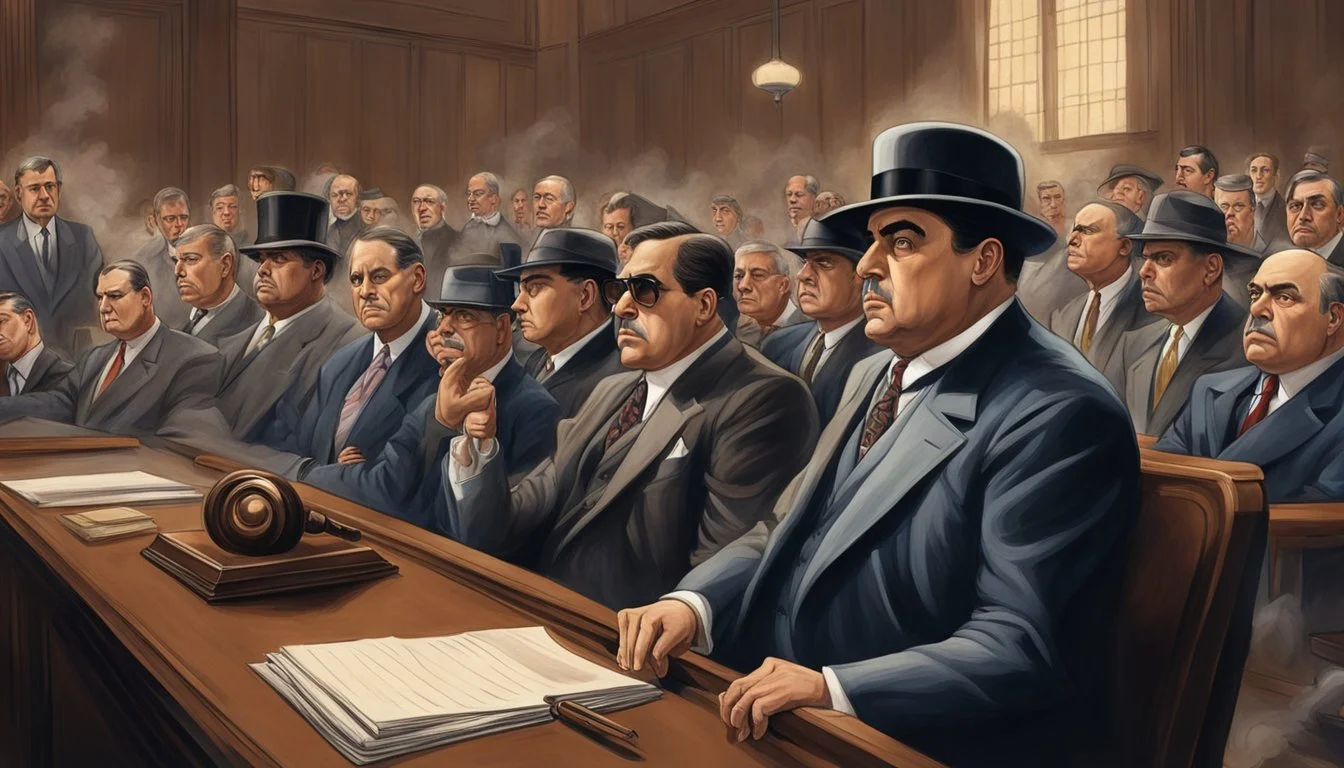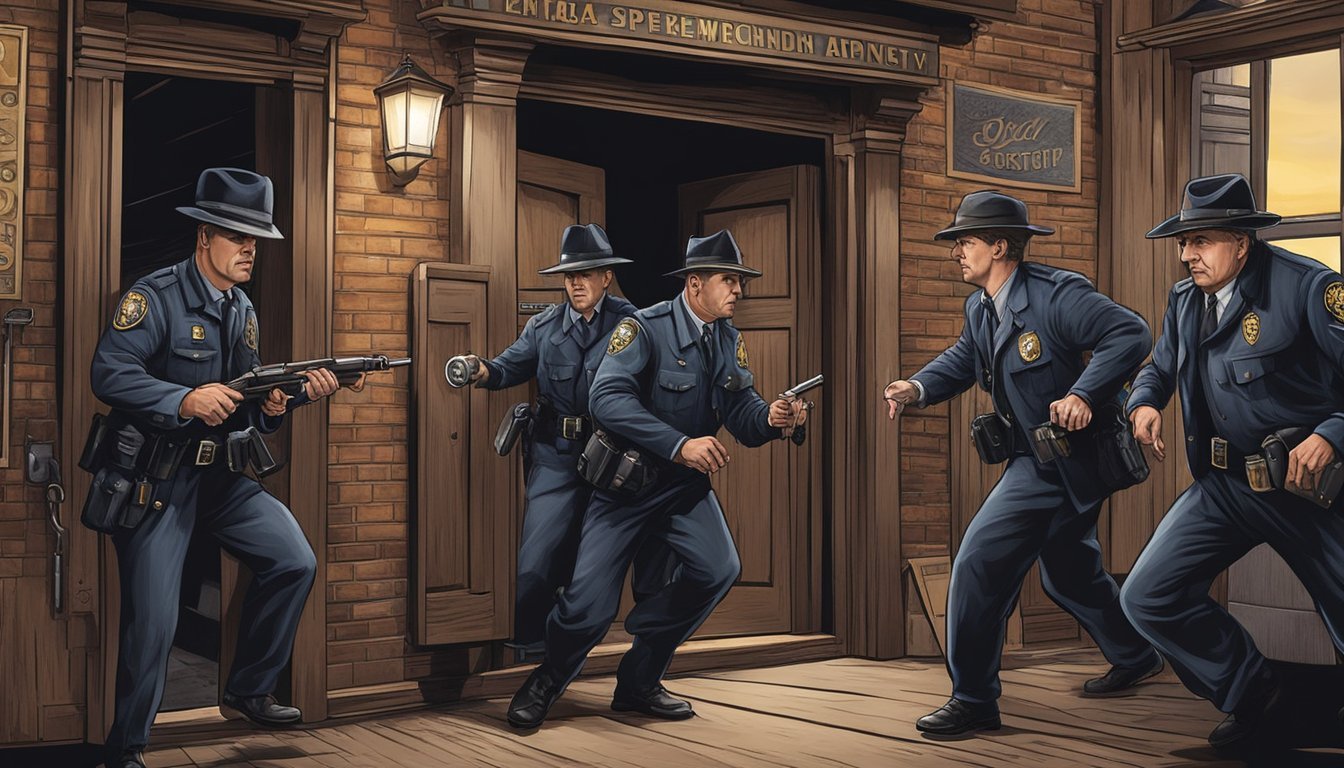Chicago's Crime Busters: The Real 'Untouchables'
Modern-Day Heroes Tackling Urban Crime
In the annals of American law enforcement, few groups have captured the public imagination quite like "The Untouchables." Led by Eliot Ness, this team of special agents from the U.S. Bureau of Prohibition worked tirelessly from 1930 to 1932 to dismantle Al Capone's criminal empire in Chicago. Their fearless and incorruptible nature earned them their iconic nickname and cemented their place in history as legendary crime fighters.
The real Untouchables consisted of handpicked agents known for their diligence and honesty. These "dry agents" aggressively enforced Prohibition laws against Capone's organization, targeting his illegal alcohol operations. Their efforts played a crucial role in the ultimate downfall of one of America's most notorious gangsters.
While Hollywood has dramatized their exploits, the true story of the Untouchables is one of dedication, bravery, and unwavering commitment to justice. Their legacy continues to inspire law enforcement professionals and captivate the public, serving as a reminder of the power of integrity in the face of overwhelming corruption and violence.
Prohibition and the Rise of Crime in Chicago
Prohibition ushered in an era of rampant crime and corruption in Chicago. The city became a hotbed for illegal alcohol production and distribution, attracting powerful organized crime figures.
The Volstead Act and National Prohibition Act
The Volstead Act and National Prohibition Act of 1919 banned the production, sale, and transport of alcohol in the United States. This legislation created a lucrative black market for liquor in Chicago.
Local politicians and law enforcement often turned a blind eye to illegal activities, accepting bribes from bootleggers and speakeasy owners. The demand for alcohol remained high, driving prices up and enticing criminal organizations to enter the trade.
Chicago's strategic location near the Canadian border made it an ideal hub for smuggling operations. The city's extensive network of railways and waterways facilitated the distribution of contraband alcohol throughout the Midwest.
Al Capone and the Chicago Outfit
Al Capone rose to prominence during Prohibition as the leader of the Chicago Outfit. He capitalized on the illegal alcohol trade, establishing a vast criminal empire.
Capone's organization controlled speakeasies, brothels, and gambling dens across the city. He employed brutal tactics to eliminate rivals and maintain his grip on power.
The Chicago Outfit's influence extended beyond illegal activities. Capone cultivated relationships with politicians, judges, and police officials, ensuring protection for his operations.
At the height of his power, Capone's annual income was estimated at $100 million. His flamboyant lifestyle and media attention made him a notorious figure in Chicago and across the nation.
Bootlegging and Illegal Breweries
Bootlegging operations in Chicago ranged from small-scale home distilleries to large, sophisticated breweries. Criminal groups often took over legitimate breweries, converting them to produce illegal alcohol.
Mobsters established distribution networks, employing truck drivers, boat captains, and warehouse workers to transport and store their products. Speakeasies proliferated throughout the city, operating under the protection of corrupt officials.
Many bootleggers cut corners to increase profits, producing low-quality or dangerous alcohol. Some mixed industrial alcohol with flavorings, while others created potent concoctions known as "bathtub gin."
The demand for illegal alcohol led to violent turf wars between rival gangs. Drive-by shootings and bombings became common occurrences in Chicago's streets as criminal organizations fought for control of lucrative territories.
The Untouchables: Origins and Operations
The Untouchables emerged as a specialized law enforcement unit to combat organized crime during Prohibition. This elite team, led by Eliot Ness, gained fame for their incorruptibility and successful operations against Al Capone's criminal empire.
Formation of the Intelligence Unit
In 1929, the U.S. Justice Department created a special unit to target Al Capone's illegal alcohol operations in Chicago. The Treasury Department's Bureau of Prohibition selected Eliot Ness to lead this new Intelligence Unit.
Ness carefully handpicked a team of agents known for their honesty and dedication. These men underwent rigorous training in surveillance techniques, firearms, and legal procedures.
The unit's primary goal was to disrupt Capone's bootlegging activities by raiding illegal breweries and gathering evidence for prosecution.
Eliot Ness and His Notable Prohibition Agents
Eliot Ness, at 26 years old, became the face of the Untouchables. His leadership and integrity set the tone for the entire unit.
Notable agents included:
Martin Lahart: Expert marksman
Sam Seager: Former football player known for his strength
Barney Cloonan: Skilled investigator
These agents earned a reputation for being incorruptible, refusing bribes and staying committed to their mission. Their dedication and bravery in the face of danger became legendary.
High-Profile Raids and Operations
The Untouchables conducted numerous successful raids on Capone's illegal breweries and speakeasies. Some notable operations included:
The raid on Capone's largest brewing operation, seizing equipment worth millions
Interception of liquor shipments along Lake Michigan
Seizure of multiple bootlegging trucks in a single day
These raids dealt significant blows to Capone's organization, disrupting his cash flow and damaging his reputation. The Untouchables' efforts contributed to the eventual downfall of Al Capone and his criminal empire.
The unit's success garnered public attention and support, boosting morale among law enforcement agencies fighting organized crime in Chicago.
Legal Battles and the Fall of Al Capone
Tax evasion charges proved instrumental in bringing down Al Capone's criminal empire. Law enforcement agencies employed innovative strategies to dismantle organized crime networks and secure convictions against key figures.
The Role of Tax Evasion Charges
The U.S. Treasury Department played a crucial role in Capone's downfall. Investigators meticulously built a case around his failure to pay income taxes on illicit earnings. This approach circumvented the challenges of proving Capone's direct involvement in violent crimes.
Key evidence included:
Financial records
Witness testimonies
Luxury purchases inconsistent with reported income
Prosecutors successfully argued that Capone's lavish lifestyle was funded by unreported criminal profits. The tax evasion strategy proved effective where traditional law enforcement methods had failed.
Strategies in Dismantling Organized Crime
Law enforcement agencies developed new tactics to combat organized crime. These included:
Financial investigations
Witness protection programs
Undercover operations
Corruption within local police forces hindered efforts to prosecute criminals. Federal agencies stepped in to lead investigations, reducing the impact of bribed officials.
Eliot Ness and his team of "Untouchables" gained fame for their incorruptible nature. They focused on disrupting Capone's bootlegging operations, weakening his financial base.
The combined efforts of various agencies ultimately led to Capone's conviction. He was sentenced to 11 years in federal prison, marking a significant victory against organized crime in Chicago.
Impact and Legacy of the Untouchables
The Untouchables left an indelible mark on American law enforcement and popular culture. Their efforts against organized crime in Chicago reshaped public perceptions and influenced future policing strategies.
Public Image and Fight Against Corruption
Eliot Ness and his team of Untouchables became symbols of integrity in a time of widespread corruption. Their refusal to accept bribes and unwavering commitment to enforcing Prohibition laws earned them respect from the public. This image of incorruptibility boosted morale among honest law enforcement officers and citizens alike.
The Untouchables' success in targeting Al Capone's illegal operations demonstrated that organized crime was not invincible. Their methods, which focused on financial investigations and gathering solid evidence, proved effective against sophisticated criminal enterprises.
Influence on Subsequent Law Enforcement Efforts
The tactics employed by the Untouchables set new standards for combating organized crime. Their emphasis on thorough investigation and building strong cases became a model for future law enforcement agencies.
Many police departments and federal agencies adopted similar approaches in their fight against corruption and organized crime. The legacy of the Untouchables inspired a new generation of law enforcement professionals dedicated to upholding the law without compromise.
Their story also captured the public imagination, spawning books, films, and TV series that further cemented their place in American cultural history. This enduring popularity has kept the ideals of integrity and dedication in law enforcement at the forefront of public consciousness.
Representation in Media and Popular Culture
Chicago's crime-busting "Untouchables" have captured the public imagination through various forms of media. Their story has been adapted into films, TV shows, and books, often dramatizing the team's efforts to bring down Al Capone's criminal empire.
The Untouchables Feature Film
Brian De Palma's 1987 film "The Untouchables" brought the legend to the big screen. Kevin Costner portrayed Eliot Ness, leading a star-studded cast including Sean Connery as Jim Malone. The movie, based on a screenplay by David Mamet, dramatized the team's battle against Capone's organization.
The film received critical acclaim and commercial success. It won four Academy Award nominations, with Sean Connery winning for Best Supporting Actor. The movie's portrayal of 1930s Chicago and its depiction of the "Untouchables" team became iconic in popular culture.
Literature and Television Portrayals
The "Untouchables" story has been told in various books and TV adaptations. Eliot Ness's autobiography, co-written with Oscar Fraley, became a bestseller and sparked public interest in the team's exploits.
Television brought the story to a wider audience. The popular ABC series "The Untouchables" (1959-1963) starred Robert Stack as Eliot Ness. This show contributed significantly to the team's legendary status in American culture.
More recent TV productions have revisited the topic, offering new perspectives on the era of Prohibition and organized crime in Chicago. These adaptations continue to keep the "Untouchables" story alive in the public consciousness.
Related Social Issues and the End of Prohibition
Prohibition's repeal marked a significant shift in American society, impacting crime rates, public health, and social norms. The end of the "noble experiment" brought both positive and negative consequences for Chicago and the nation.
The Repeal of the 18th Amendment
The 21st Amendment, ratified on December 5, 1933, officially ended Prohibition in the United States. This historic decision came after years of widespread disillusionment with the 18th Amendment's effectiveness.
Public opinion had shifted dramatically since 1920. Many Americans viewed Prohibition as a failed policy that fueled organized crime and corruption.
The Great Depression also played a crucial role in hastening Prohibition's demise. Legalizing alcohol promised new tax revenues and job creation, which were desperately needed during the economic crisis.
Effects on Crime Syndicates and Public Health
The repeal of Prohibition dealt a significant blow to crime syndicates that had profited from bootlegging. However, many criminal organizations quickly adapted by shifting their focus to other illegal activities.
Organized crime groups diversified into gambling, prostitution, and labor racketeering. This transition allowed them to maintain their power and influence in cities like Chicago.
Public health saw mixed results following Prohibition's end. Alcohol-related deaths initially decreased as the quality of legally produced spirits improved. However, increased accessibility led to a gradual rise in alcohol consumption and related health issues over time.
Juvenile delinquency rates, which had risen during Prohibition, began to stabilize. The glamorization of bootleggers and speakeasies lost its appeal among youth.
Venereal disease rates, which had been linked to illegal drinking establishments, saw a modest decline as regulated bars replaced speakeasies.



